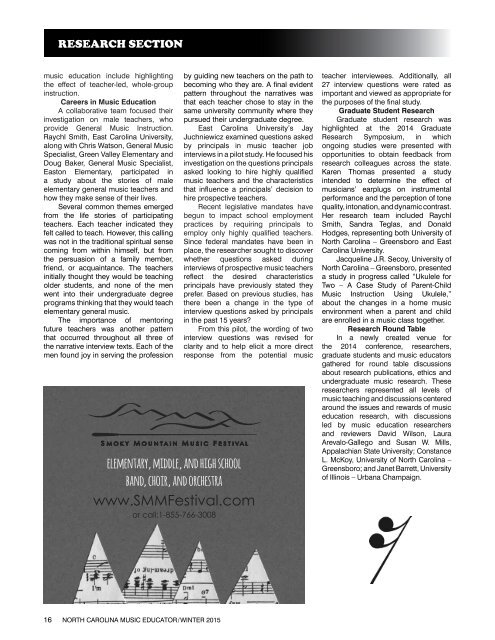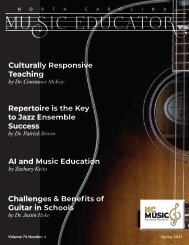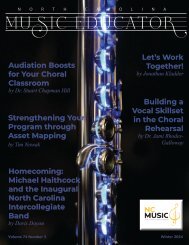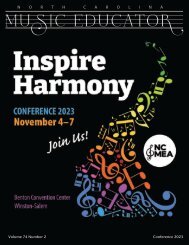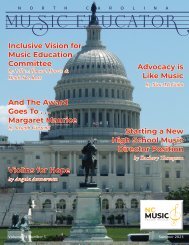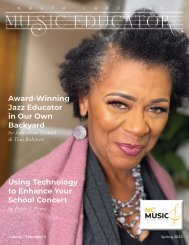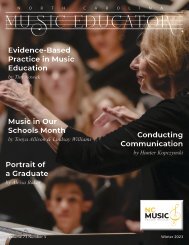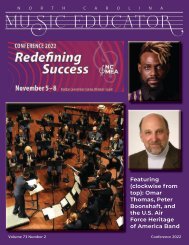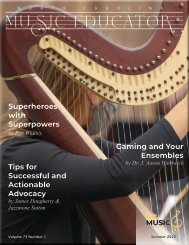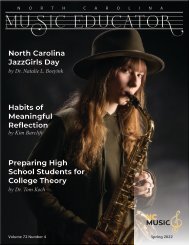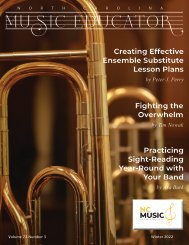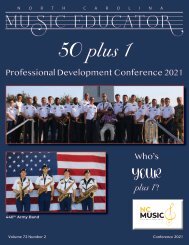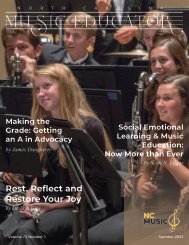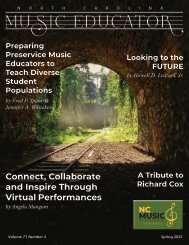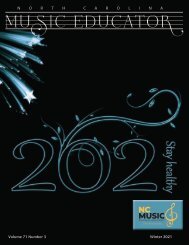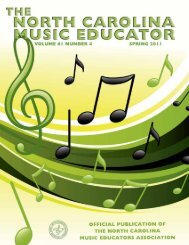NC Music Educator Winter 2015
North Carolina Music Educators Association Journal Winter 2015
North Carolina Music Educators Association Journal Winter 2015
You also want an ePaper? Increase the reach of your titles
YUMPU automatically turns print PDFs into web optimized ePapers that Google loves.
RESEARCH SECTION<br />
music education include highlighting<br />
the effect of teacher-led, whole-group<br />
instruction.<br />
Careers in <strong>Music</strong> Education<br />
A collaborative team focused their<br />
investigation on male teachers, who<br />
provide General <strong>Music</strong> Instruction.<br />
Raychl Smith, East Carolina University,<br />
along with Chris Watson, General <strong>Music</strong><br />
Specialist, Green Valley Elementary and<br />
Doug Baker, General <strong>Music</strong> Specialist,<br />
Easton Elementary, participated in<br />
a study about the stories of male<br />
elementary general music teachers and<br />
how they make sense of their lives.<br />
Several common themes emerged<br />
from the life stories of participating<br />
teachers. Each teacher indicated they<br />
felt called to teach. However, this calling<br />
was not in the traditional spiritual sense<br />
coming from within himself, but from<br />
the persuasion of a family member,<br />
friend, or acquaintance. The teachers<br />
initially thought they would be teaching<br />
older students, and none of the men<br />
went into their undergraduate degree<br />
programs thinking that they would teach<br />
elementary general music.<br />
The importance of mentoring<br />
future teachers was another pattern<br />
that occurred throughout all three of<br />
the narrative interview texts. Each of the<br />
men found joy in serving the profession<br />
by guiding new teachers on the path to<br />
becoming who they are. A final evident<br />
pattern throughout the narratives was<br />
that each teacher chose to stay in the<br />
same university community where they<br />
pursued their undergraduate degree.<br />
East Carolina University’s Jay<br />
Juchniewicz examined questions asked<br />
by principals in music teacher job<br />
interviews in a pilot study. He focused his<br />
investigation on the questions principals<br />
asked looking to hire highly qualified<br />
music teachers and the characteristics<br />
that influence a principals’ decision to<br />
hire prospective teachers.<br />
Recent legislative mandates have<br />
begun to impact school employment<br />
practices by requiring principals to<br />
employ only highly qualified teachers.<br />
Since federal mandates have been in<br />
place, the researcher sought to discover<br />
whether questions asked during<br />
interviews of prospective music teachers<br />
reflect the desired characteristics<br />
principals have previously stated they<br />
prefer. Based on previous studies, has<br />
there been a change in the type of<br />
interview questions asked by principals<br />
in the past 15 years?<br />
From this pilot, the wording of two<br />
interview questions was revised for<br />
clarity and to help elicit a more direct<br />
response from the potential music<br />
elementary, middle, and high school<br />
band, choir, and orchestra<br />
www.SMMFestival.com<br />
or call:1-855-766-3008<br />
teacher interviewees. Additionally, all<br />
27 interview questions were rated as<br />
important and viewed as appropriate for<br />
the purposes of the final study.<br />
Graduate Student Research<br />
Graduate student research was<br />
highlighted at the 2014 Graduate<br />
Research Symposium, in which<br />
ongoing studies were presented with<br />
opportunities to obtain feedback from<br />
research colleagues across the state.<br />
Karen Thomas presented a study<br />
intended to determine the effect of<br />
musicians’ earplugs on instrumental<br />
performance and the perception of tone<br />
quality, intonation, and dynamic contrast.<br />
Her research team included Raychl<br />
Smith, Sandra Teglas, and Donald<br />
Hodges, representing both University of<br />
North Carolina – Greensboro and East<br />
Carolina University.<br />
Jacqueline J.R. Secoy, University of<br />
North Carolina – Greensboro, presented<br />
a study in progress called “Ukulele for<br />
Two – A Case Study of Parent-Child<br />
<strong>Music</strong> Instruction Using Ukulele,”<br />
about the changes in a home music<br />
environment when a parent and child<br />
are enrolled in a music class together.<br />
Research Round Table<br />
In a newly created venue for<br />
the 2014 conference, researchers,<br />
graduate students and music educators<br />
gathered for round table discussions<br />
about research publications, ethics and<br />
undergraduate music research. These<br />
researchers represented all levels of<br />
music teaching and discussions centered<br />
around the issues and rewards of music<br />
education research, with discussions<br />
led by music education researchers<br />
and reviewers David Wilson, Laura<br />
Arevalo-Gallego and Susan W. Mills,<br />
Appalachian State University; Constance<br />
L. McKoy, University of North Carolina –<br />
Greensboro; and Janet Barrett, University<br />
of Illinois – Urbana Champaign.<br />
16 NORTH CAROLINA MUSIC EDUCATOR/WINTER <strong>2015</strong>


